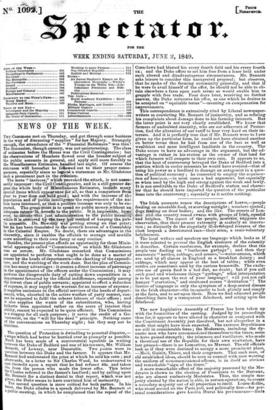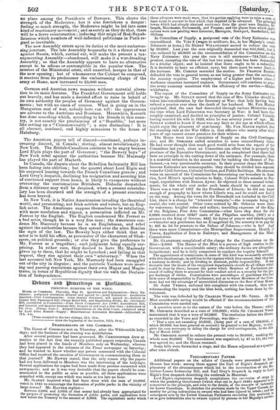The new Legislative Assembly of France has been taken up
with the formalities of the opening. Judged by its proceedings thus far, it appears to have altered in character as compared with the Constituent Assembly just dissolved, but not altogether in mode that might have been expected. The extreme Republicans are still in considerable force ; the Moderates, including the dy- nastic men who have accommodated themselves to the times, seem to have gained strength ; the trimmers and vacillators, who made a theatrical use of the Republic for their own exaltation, have lost ground—there is no Lamartine, no Marrast. The old officials look as if they were destined to occupy a more prominent place, —Mole Guizot, Thiers, and their congeners. That such men, of old established ideas, should be seen in council with men wearing the uniform of noncommissioned officers, is in itself an obvious and remarkable "sign of the times."
A more remarkable effect of the majority possessed by the Mo- derates is shown in the election of Presidents to the Bureaux, who are almost exclusively Moderates. Thus, the simple ma- jority elected by the nation is able, in certain operations, to create a secondary majority out of all proportion to itself. Ledru-Rollin, who stood second on the Paris poll, and politically first—for per- sonal considerations gave Lucien Murat his preeminence—thy:Is
no place among the Presidents of Bureaux. This shows the strength of the Moderates ; but it also foretokens a danger : feeling so much strength, the Moderates might be led into some kind of reactionary movement ; and as surely as they do that, there will be a fierce counteraction ; inducing that reign of Red-Repub- licanism which numbers. of well-informed politicians in Paris, re- gard as inevitable. The new Assembly enters upon its duties at the most embarras- sing juncture. The late Assembly bequeaths to it a threat of war against Russia, which, carried out., will make the present a tax- augmenting Assembly—abandoned, will make it a war-dreading Assembly ; so that the Assembly appears to have no alternative except to be odious or contemptible in the popular view. The interest of the Ministerial crisis, still unsettled, merges in that of the new opening; but of whomsoever the Cabinet be composed, st receives from its predecessor the embarrassing charge of the army at Rome, now increased to 25,000 men.



























